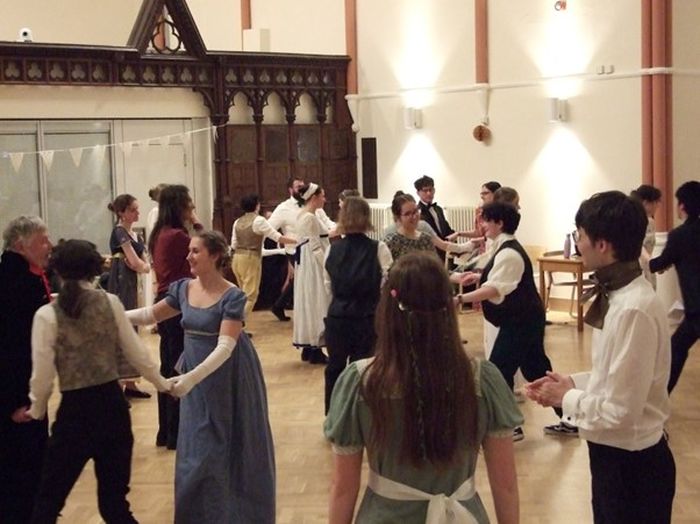Folk therapy: a night of fun with the Ceilidh Band
Isabel Dempsey discovers the therapeutic effects of Cambridge’s folk revival

If you’ve ever found yourself in the Anchor on a Thursday night (on the hunt to empty your wallet perhaps?) you’ve probably struggled to find a table for your pint of mango cider. While Varsity hacks like myself discuss our latest leads below, the Cambridge University Ceilidh Band can be found on the floor above jamming out to folk tunes on their fiddles. However, this week I decided to say farewell to the newsies, bridge the divide, and spend a night of folk and fun with the band instead.
“Fluidity and relaxed sociability seems to be a key selling point of the band”
For those of you who don’t know, ceilidh (pronounced kay-lee if you’ve been struggling over that one for the last paragraph) is basically another word for folk music – usually Scottish or Irish but the band incorporates elements of English tradition too. Think the sort of traditional tunes you could imagine blaring across the Highlands or jigging to in a “ye olde” pub. Those were exactly the sounds that greeted me as I walked into Downing Place Church for their weekly pre-pub rehearsals. Despite being awkwardly instrument-less among a sea of violins, flutes and guitars, I soon found that this wouldn’t hinder my level of enjoyment or participation. While one member explained the rhythm of a piece to the band, I found myself clapping along to the beat of “I love ceilidh band” and “ceilidh band loves me”. Although everybody made a point of explaining that the (in their words) “embarrassing” cult-like chanting was not a usual feature of the evening, I personally found it charming.
“When you play a tune fast it’s like some kind of stress relief”
During the break, we moved rooms to a well-stocked table of squash and biscuits (ginger nuts and party rings very much available for consumption). Grabbing the society presidents for a quick chat, I asked them how they got into the niche world of folk music. Rosa explained that she comes from Cornwall where “there is a lot of folk tradition revival going on”. Initially, she was more involved in the dance side of the tradition. Although the band’s weekly sessions are mostly music-based, they still hold frequent ceilidh dances across the university and can even be booked for events. As someone who has attended a ceilidh before I can attest that they are plenty of chaotic fun, albeit a bit of a workout. Do make sure to BYOWB (Bring Your Own Water Bottle) or you’ll find yourself fending off your dance partner for a plastic cup.

The band’s co-president, however, “got into folk music because my grandparents listened to a lot of it.” Although insisting that it’s not a “lost form”, it is certainly a “niche” associated with an older generation. Rosa told me: “student ceilidhs are always really nice because I’ve been to so many ceilidhs that are just old people”. When discussing their efforts to encourage more young people to get involved, the band’s openness and accessibility repeatedly cropped up. They provide notated folders that make it “quite easy” to participate regardless of musical experience. As for the music itself, there was a wonderful array of instruments on display from harps and whistles, to accordions and melodeons, to one guy just tapping along with clogs. While classical music may leave you coming away from rehearsals stressed from the intense focus, Rosa called ceilidh “folk therapy”, saying: “when you play a tune fast it’s like some kind of stress relief”.
As another member observed: “it’s half social, half music”. The social side revealed itself as we moved from Downing Place to the Anchor. Rosa tells me one of the best things about folk music is: “you can go to a session in a pub anywhere in the country and you’ll hear tunes that we’re playing played there”. Members discussed some of their favourite seshes, such as the Inter-Varsity Ceilidh where they played in this same pub with Oxford. Recalling the lively sound and atmosphere, they told me it was so packed that “there was no floor to step on”. Their yearly tour, a heavily subsidised holiday that lets them play together in Britain’s folk hotspots, seems like a major highlight, with them often “playing folk tunes till one in the morning”. Expressing concern at their potential exhaustion, the band explained that you can “watch for one or two, then play for a bit. It’s so fluid.” On top of the chance to connect with musical tradition, this “zero commitment” fluidity and relaxed sociability seems to be a key selling point of the band. Whether it’s to play, dance, call at a ceilidh, or simply appreciate the music, there seems to be something for everyone, no matter your experience in this weird and wonderful world.
 Comment / Cambridge is right to scrap its state school target1 May 2024
Comment / Cambridge is right to scrap its state school target1 May 2024 News / Academics call for Cambridge to drop investigation into ‘race realist’ fellow2 May 2024
News / Academics call for Cambridge to drop investigation into ‘race realist’ fellow2 May 2024 Sport / The diary of a Bumps rower24 April 2024
Sport / The diary of a Bumps rower24 April 2024 Features / Will May Balls ever be sustainable?30 April 2024
Features / Will May Balls ever be sustainable?30 April 2024 News / Emmanuel College cuts ties with ‘race-realist’ fellow19 April 2024
News / Emmanuel College cuts ties with ‘race-realist’ fellow19 April 2024





